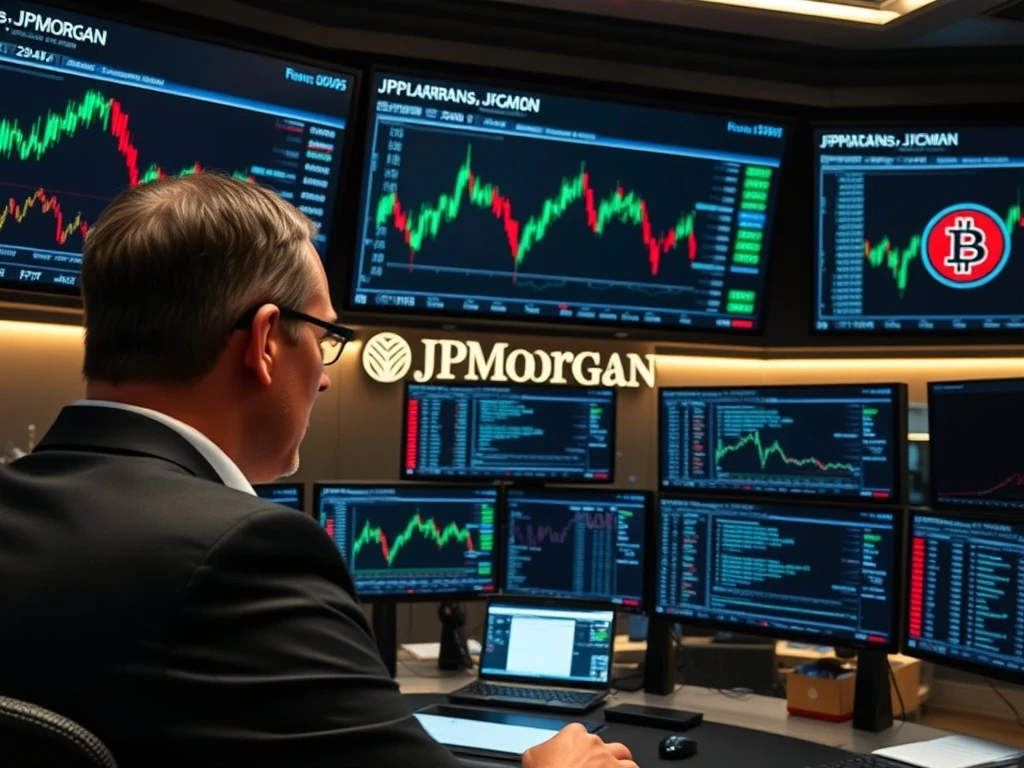JPMorgan Crypto Trading: Giant Bank Revolutionizes Digital Asset Services

The financial world is abuzz with a significant announcement. TradFi giant JPMorgan is poised to expand its presence in the digital asset market. This move signals a deeper commitment to the evolving cryptocurrency landscape. The banking behemoth confirms plans to offer JPMorgan crypto trading services for its institutional clients. This development marks a pivotal moment for traditional finance.
JPMorgan Crypto Trading: A Pivotal Shift for Clients
JPMorgan executive Scott Lucas recently confirmed these exciting developments. He serves as the global head of markets and digital assets. Lucas stated that crypto trading services are actively in development. This represents a substantial shift for the banking giant. However, a key distinction emerged from his statements. JPMorgan remains hesitant to handle crypto custody directly at this time.
During an appearance on CNBC’s Squawk Box Europe, Lucas addressed the question of crypto custody. He clarified that direct custody is not on the bank’s immediate horizon. “I think Jamie [Dimon] was pretty clear on investor day that we’re going to be involved in the trading of that, but custody is not on the table at the moment,” Lucas explained. He also added, “There’s a lot of questions around our own risk appetite and how far we wanna go down that path, from trading and other sides of it, and custody I guess would follow.” This cautious approach underscores the bank’s careful risk assessment. JPMorgan is currently exploring suitable third-party custodians for its operations.
Driving Institutional Crypto Adoption
JPMorgan is increasingly embracing a multifaceted strategy for digital assets. Lucas referred to this as an “and” approach. This means the bank aims to capitalize on both existing market opportunities and new innovations. “There’s the existing market and there’s opportunities to do new things. And those ‘and’ opportunities aren’t exclusive to one or the other,” he noted. This comprehensive strategy is crucial for driving institutional crypto adoption. It allows JPMorgan to explore various avenues simultaneously.
The bank’s increased engagement became more evident in 2023. Partnerships with industry leaders like Coinbase exemplify this trend. Furthermore, the shift in tone from CEO Jamie Dimon has been notable. Dimon, once a vocal crypto skeptic, expressed a new perspective. In August, he stated his belief in stablecoins. He also acknowledged the inherent value of blockchain technology. This evolving viewpoint from leadership undoubtedly influences JPMorgan’s strategic direction. It signals a growing acceptance of digital assets within traditional financial institutions.
Advancing Stablecoin Development and JPMD
JPMorgan is actively pursuing opportunities in various digital asset categories. Its proprietary deposit token, JPMD, launched in a pilot phase on Base in June. Lucas expressed enthusiasm for JPMD’s potential. He sees it as a valuable tool for servicing institutional clients on the cash side. “I think it’s really exciting, there’s a real opportunity for us to think about how we can offer different services for our clients on the cash side,” he remarked. The bank is also closely monitoring the broader landscape of stablecoins.
Responding to client demand for stablecoins is a key priority. Lucas highlighted that the bank’s strategy in this area is still evolving. “And that strategy is still emerging, as you can understand. It’s only really been a few months since we’ve had some more clear regulation around what the opportunity looks like,” he clarified. Clearer regulatory frameworks are proving vital. They provide a more defined pathway for stablecoin development and integration within financial services. This regulatory clarity helps shape JPMorgan’s approach to offering these new services.
The Future of Blockchain Technology at JPMorgan
JPMorgan’s vision for the blockchain space is expansive. The bank does not foresee a single network dominating the market. Instead, it anticipates a diverse ecosystem of platforms. “I don’t think there’ll be one, and actually we expected some consolidation in that space and now we’re seeing a bunch of new layer 1s being rolled out,” Lucas explained. This perspective opens numerous opportunities for the bank. It can engage with various public blockchains in the near future. This approach reflects a pragmatic understanding of the rapidly evolving decentralized landscape.
The bank sees considerable potential across multiple blockchain networks. “So there’s a lot to play for when it comes to the public blockchain, we certainly see opportunity there and we will be doing things in that space in the coming quarters,” Lucas affirmed. This indicates forthcoming initiatives from JPMorgan. These efforts will further integrate advanced blockchain technology into its operations. The bank aims to leverage these innovations to enhance its offerings and improve efficiency for clients.
Expanding Digital Asset Services in Traditional Finance
JPMorgan’s strategic moves have broader implications for the financial industry. Their entry into crypto trading validates the asset class. It also encourages other traditional financial institutions to follow suit. This trend towards integrating digital asset services into conventional banking is accelerating. It reflects a growing demand from institutional investors for exposure to cryptocurrencies. Furthermore, it highlights the increasing maturity of the digital asset market.
The bank’s cautious yet progressive stance positions it uniquely. It can navigate the complexities of regulatory uncertainty. At the same time, it meets evolving client needs. This measured approach ensures sustainable growth in the digital asset sector. As regulations become clearer, JPMorgan is prepared to scale its offerings. This includes both proprietary solutions like JPMD and broader crypto trading capabilities. The integration of these services marks a significant milestone. It bridges the gap between traditional finance and the innovative world of digital assets.
JPMorgan’s commitment to offering crypto trading services signals a new era. It demonstrates a profound shift in how established financial institutions view digital assets. The bank’s “and” approach, combined with its exploration of blockchain technology and stablecoins, sets a precedent. This will undoubtedly influence the trajectory of institutional involvement in the crypto market for years to come.







